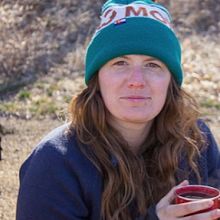
Professor of Biology Maurine Neiman has a very pragmatic view of writing. When I ask her if she has a writing process, she has to think for a minute. “I don’t need very particular conditions to write. If I have a couple of minutes, I just sit down and do it.” Writing is something she does every day, as part of her work, and she sees it primarily as a means of communicating her research to colleagues or the insights of science to the public. This is not to say she always finds it easy. She likes to write early in the day because, as she notes, “it can be a bit intimidating,” especially at the start of a project when facing a blank page. Nor does it mean that she doesn’t see writing as a creative process. She loves the precision and clarity of good scientific writing as well as the art of situating an experiment on snails (her model organism) in the bigger story of the evolution of two-sex species.
Clarity and context are two important themes of her graduate course Writing in the Natural Sciences. Created by Steve Hendrix, Professor Emeritus of the Department of Biology, and based loosely on the Writer’s Workshop, it was initially envisioned as a place for interested students to share their dissertation proposals. It is now a required class for all Biology graduate students who workshop a substantial project — a dissertation proposal, a review, an article, or, occasionally, an undergraduate honors thesis — three times during the course of the semester, producing increasingly refined and updated drafts. Along with her coinstructor, Assistant Professor of Biology Dan Summers, Neiman reads and comments on the three or four drafts discussed each week and sets clear parameters for the workshopping process. Most importantly, she asks students to be respectful and kind, and not to take criticism personally. She also encourages them to offer constructive comments that include explanations of problems and suggestions for how to correct them.
In addition to modelling a positive approach to feedback, Neiman shares her own writing strategies in class. She suggests starting with “the easiest kind of writing,” straightforward descriptions of methods and results, to build confidence and momentum. She also describes how she moves back and forward between reading and writing, making notes about useful information, and turning to the literature to find support for her arguments. This, of course, is the mark of a writer who is an expert in her field, but it is also an important strategy for graduate students to learn as they often imagine that they can’t start to write until they’ve read everything that’s ever been published on their topic. And while Neiman emphasizes the importance of grammar and clarity, she also acknowledges to her students that language and disciplinary conventions can seem arbitrary.
Neiman took over the course when Hendrix retired because of her interest in writing and her desire to pass on some of the skills she learned to her students. The course has, from the beginning, been interdisciplinary, open to all kinds of science students, and Neiman has continued the push to bring in students from other departments. With a joint appointment in the Department of Gender, Women and Sexuality Studies, she has also expanded the content to include a focus on ethics and social justice, topics that are not usually a part of a biology curriculum. She argues that it is important that young scientists be equipped to see and engage with issues of access and inequity, such as paywalls that limit access to scientific literature, the uneven global distribution of the benefits of scientific research, and the continued underrepresentation of women and people of color in many fields.
The most difficult thing for Neiman about teaching a writing course is that developing strong writing skills takes time. One semester is just not long enough to see measurable improvements, something Neiman sometimes finds herself having to remind colleagues who grumble that they thought their students would emerge from her course with flawless projects. She also notes that students who arrive in science departments with strong writing skills have usually been reading and writing from a young age, which illustrates for her the impossibility of separating writing from its social context and the importance of being aware of how wealth and privilege give some students enormous advantages. But writing skills do improve with practice, she finds, and students are particularly engaged and motivated by the social justice issues she raises. “This is an area where I think the course has a big impact, just by raising awareness, and that is very satisfying.”
In terms of doing more for students, Neiman points to the importance of providing lots of opportunities to write early in the college years, as she experienced in the small, writing-intensive, liberal arts college she attended as an undergraduate student. But science faculty at the University of Iowa typically teach large undergraduate courses where there is not a lot of time or TA support for assigning writing. “As much as I think it is important, I don’t often ask my undergraduate students to write in my classes because I don’t have time to grade it.” She notes that while she has been fortunate enough to have the support of the Department of Biology and a series of "excellent coinstructors," there generally aren’t a lot of incentives for science graduate students to take writing classes or to learn how to teach science writing. Advisors keep their students busy in the lab and encourage them to stick to required courses so they can graduate as soon as possible.

One graduate student who has resisted the pressure to stay in her lane and embraced opportunities to learn new skills is Krista Osadchuk. As a PhD student in the Department of Biology, Writing in the Natural Sciences was a required course, but she explains, with a laugh, that she would have taken it anyway. “It was the year that I decided to focus on writing.” (In her first year of graduate school she decided to learn as much as she could about teaching, and in her second year she turned her attention to public speaking). Other than a couple of literature papers, she hadn’t written a lot as an undergraduate student and she didn’t feel prepared for the kind of writing she was asked to do in graduate school. “I didn’t really understand what science writing was, or what it meant to write well, or how to structure a paper. I honestly didn’t think structure mattered. I just thought I had to give people information.” She quickly learned from her advisor that writing, even in the sciences, is a rhetorical exercise — “you have to tell a story, and convince your reader that your data and your interpretation of the data is correct” — a lesson that was reinforced in Neiman's course. But what she also learned in Writing in the Natural Sciences was an understanding of the writing process. “It was so beneficial to see how other people write and to get multiple sets of feedback on my own writing. I learned to appreciate that writing is a reiterative process and not to expect to get it right on the first try.”
The following semester Osadchuk enrolled in Writing in the Disciplines, an interdisciplinary graduate course taught by Megan Knight (Department of Rhetoric) and David Gooblar (Department of English). In addition to learning practical writing strategies, working with graduate students in the humanities and social sciences taught her to "take another step back” and explain her work in language accessible to non-scientists. This, she believes, helped her to develop a more narrative style than she would have otherwise, a style is less often seen in science. “People mostly seem to like it,” she tells me with a grin. “They’ll come up to me at conferences to let me know that their minds didn’t wander because it felt like I was telling them a story!” A year later she decided she wanted more experience teaching writing and enrolled in Teaching in a Writing Center, a practicum course that introduces graduate students to scholarship on writing pedagogy and trains them to work in the Writing Center. For the last three years she has worked as a Writing Center tutor and served as a mentor for undergraduate Writing Fellows. Like Neiman, she emphasizes to students the importance of making notes while they’re reading and encourages them to reverse outline their papers to help with structure. She enjoys the relationships she develops, and occasionally receives letters from grateful students who have been accepted to graduate school or finally submitted a dissertation. “I like the intimacy of one-on-one tutoring,” she reflects. “It’s been really helpful for my teaching, and for my own writing as well.”